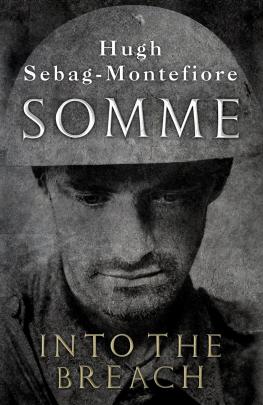New Zealand's contribution is well-represented in Hugh Sebag-Montefiore's book on the Somme, writes Oliver Riddell.
SOMME: INTO THE BREACH
Hugh Sebag-Montefiore
Viking/Penguin Random House

By OLIVER RIDDELL
It now seems widely acknowledged that World War 1 (1914-18) was the watershed event of the past two centuries, with so many things leading up to it and so many things flowing from it. The centennial of the middle year, 1916, is being marked at present.
The year 1916 saw four key battles that have set the tone and the issues for today. At the Battle of Jutland, the German High Seas fleet assaulted its jailer, the British Royal Navy, but remained in jail. That led to famine in central and eastern Europe, which led to the Spanish flu pandemic which killed twice as many people as died in the war.
Also in 1916, the Germans defeated Tsarist Russia so overwhelmingly that Russia went communist, with the incalculable consequences that flowed from that; Germany attacked France at Verdun, with devastating results to the morale of both peoples; and Britain and its dominions attacked Germany on the Somme, which is the subject of this book. Verdun and the Somme are both described as "battles'' when they were "campaigns'', and both lasted for months.
Most of the books on the Somme we see in New Zealand focus on the impact on Britain itself. The first of July 1916, was the bloodiest day in British history. During that day on the Somme, and mainly in the first hour, the British army suffered nearly 20,000 fatalities and more than 60,000 casualties. Luckily, no New Zealand units were present. Their turn came later.
Being so British-centred, not much is recorded about New Zealand in earlier general accounts of the Somme. But Hugh Sebag-Montefiore has cast his net much wider. In fact, considering what a small proportion of the troops on the Somme New Zealand provided, its men are very well-represented. We in New Zealand have always known a very great deal was written about our men, and it is good to see our semi- and unofficial histories of the time so well-represented in this book.
Three men who featured prominently in World War 2 for New Zealand - Bernard Freyberg, Howard Kippenberger and "Whisky Bill'' Inglis - are introduced to a wider stage here, and all three deserve to be. The New Zealand experience on the Somme mirrors that of Canada, Australia and South Africa, and justice is done to India too. Perhaps New Zealand casualties paled beside everyone elses, but 2000 died and 6000 were wounded.
Passchendaele and 1918 cast longer shadows on New Zealand's future, but the Somme should not be forgotten. But already one aspect of Sebag-Montefiore's account is threatening to overshadow all its good work. It is alleged he accuses New Zealand soldiers on the Somme of "war crimes''. Twenty-first century morality is being imposed on actions a century ago.
Technically, some of the actions of our men probably do qualify as "war crimes''. If you spend months training young men to hate and kill, and then arm them with sophisticated weaponry, then the bonds of self-discipline do wear thin. They were taught how to kill and became very good at it.
The American General Sherman, who led his men in their "march across Georgia'', famously said "war is hell''. The stain from his activities in the American Civil War still affects life in the United States. The secretary-general of the United Nations recently, most undiplomatically, lambasted world leaders for massacring their own and other people. War crimes are not new and show no signs of ending.
So to seize on this aspect of an otherwise outstanding account of the Somme makes me wonder about people's motives. How would Italy feel if Britain called on it to apologise for the Romans murdering Britons during the Boadicea Rebellion in the first century AD? Is there no statute of limitation on "war crimes''? Personally, I abominate them, but when should guilt no longer be expected or required? Have television and the movies given us so unrealistic an expectation of war that reality has gone out the window?
I hope the red herring of "war crimes'' does not damage the popularity and reputation of this terrific war book.
Oliver Riddell is a retired journalist living in Wellington.












